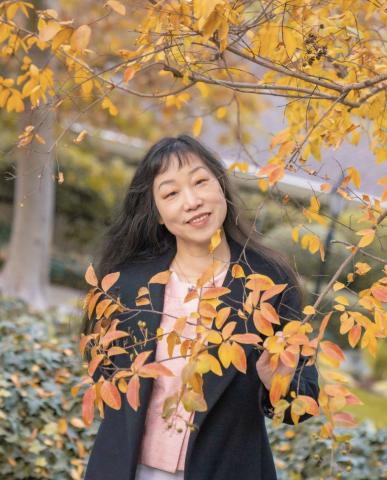
Alum Maggie Tsai Establishes PAU Innovart Research Grant
In 2018, when disruptions arose in her personal life, Maggie Tsai enrolled in an eight-week mindfulness course. “I wanted to tackle the challenge with more professional resources. Mindfulness can really help a person’s mental state, and it helps me see my situation better.” The mindfulness training sparked her interest in mental health counseling. Not long after that, she enrolled in the Clinical Mental Health Counseling program at Palo Alto University (PAU).
An Unconventional Path
Counseling isn’t Maggie’s first career path. She was a journalist and United Nations Information Officer in China before running her own company in public relations and marketing. She retired in 2009, and moved to the United States in 2011. After 10 years, she realized, “I have a lot more time, I’m ready for the second chapter of my life.” She was “the kind of person that friends would go to with their problems, to pick my brain.” Relationships and listening skills were always important in her work and life; they helped counseling come naturally to her. On the other side of her Master’s degree now, she feels like a “phoenix in metamorphosis.”
Faculty members were instrumental in shaping Maggie’s experience at PAU. She remembers two professors especially fondly: Dr. Maryasha Katz and Dr. Timothy Baima. She says, “Dr. Katz’s motto is ‘teach by love…her love exudes through the teaching process. She’s a role model for me.” Katz’s insights and mild nudges during her three internship quarters provided profound depth.
Dr. Baima also pushed students to grow, but in a different way. “His course was basically buy one, get one free! In addition to family systems, we doubled up on case conceptualization through reviewing and reflecting on our own genogram.” Maggie was able to reflect on her own life experiences, both professional and personal. Her degree helped her organize her understanding of humans and relationships into “neat boxes” of theories. “Each individual has a different experience, but as a human race, we have something in common, a collective experience. That will be the foundation for my work with clients,” Maggie explains.
Another impactful part of her experience at PAU was her work at the PAU e-Clinic. It was “one of the best parts of my experience.” She also had the opportunity to intern at the Bill Wilson Center. These internships allowed her to apply her knowledge of theories hands-on, all with guidance and feedback from experienced, empathetic professors and supervisors.
These days, Maggie is dedicating her focus to brainspotting and somatic work. She has commenced as AMFT at the private practice Saratoga Therapy. In the meantime, she’s engaged in philanthropy through her foundation, Innovart. Innovart focuses on improving the well-being of youth. It has funded programs like mindfulness workshops for teens, a middle school drama program, and talks by psychologists for parents and teens aimed at de-stigmatizing mental health issues and the concept of seeing a counselor.

Giving Back
As Maggie reflects on her experience at PAU, she determines that “it’s time to give back.” She has generously gifted $8,000 via her foundation, Innovart, to establish a research grant for counseling students at Palo Alto University.
Over an initial two-year period, the PAU Innovart Research Grant will award $1,000 research grants to eight counseling students.
Maggie is excited about all the potential this grant holds. She hopes it will create a positive cycle, where students conduct high quality research that gets published, society benefits from that research, and PAU achieves increased visibility for its wonderful work.
In her view, alumni can consider contributions of any size and type. “After graduation, the bond can continue through our small deeds.” Giving back to PAU supports current students, alumni, and the institution itself. “It doesn’t have to be monetary. It can be volunteer hours, sharing research findings, contributing ideas, or hosting workshops,” Maggie adds.
Ultimately, “we are a whole community, we feed into each other,” she explains. “Little deeds are the perpetual power that gets the ball rolling.”
